Five resumé-ready skills gained by volunteering with NCC
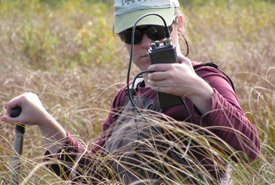
Caroline Gagne, Ottawa Valley project manager, doing telemetry research, Quebec (Photo by NCC)
Those searching for a job in the environmental sector may find it challenging to get their foot in the door to gain that valuable hands-on experience that employers are looking for. It can be especially challenging if you’re applying for your first job within your field of study. Employers expect you to have a long list of interpersonal and field-based skills, even if you’re just starting out.
So how are you supposed to gain these skills and, dare I say, gain a competitive edge in the environmental field?
Here are five resumé-ready skills you can gain simply by volunteering with the Nature Conservancy of Canada (NCC):
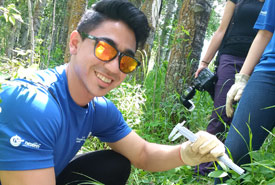
Volunteer measures tree root collar diameter with calliper. (Photo by NCC)
Skill: Familiarity with hand tools
Aside from being a skill we look for at NCC when hiring our own interns and summer staff, a familiarity with hand tools is a huge asset if you’re applying for any outdoor job. From hammers to fencing pliers, from loppers to secateurs, you’ll be a step above the competition if you take the opportunity to gain some hands-on experience with hand tools before your interview.
And volunteering with NCC is a great way to gain that hands-on experience. During my time coordinating NCC Conservation Volunteers events, I learned the difference between a rip saw and a crosscut saw, learned how to sharpen a shovel with a bastard mill file and even learned the proper technique for wielding a butterfly net. Did you know that there is a proper technique for that? I didn’t, but I do now.
Skill: Invasive species ID
There is no faster way to strengthen your invasive species ID skills than to get up close and personal with them by taking part in a community weed pull. While my native plant ID skills leave much to be desired, I could point an invasive species out to you from 100 paces away. I’ve pulled so many invasive weeds at NCC volunteer events that I now have an extensive repertoire memorized, and know some of the techniques for preventing their spread.
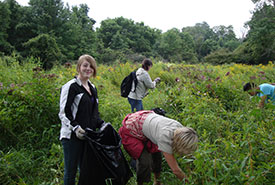
Volunteers remove invasive policeman’s helmet at the Graham property. (Photo by NCC)
So why is invasive species identification so important? Many jobs require you to have knowledge and understanding of local invasive species, including field technician positions, environmental restoration jobs, range and riparian specialists and, naturally, county weed inspectors. First-hand experience identifying and managing invasive species will give you an advantage if you’re looking to do any job that involves plant identification or land management.
Skill: Bird ID
Keeping with the ID theme, bird identification is also a useful skill to have up your sleeve, not to mention one that you can build on over a lifetime. If you have your heart set on a field-based job, you might want to brush up on your birding skills by volunteering. NCC hosts many bird surveys over the course of the year, including regular piping plover surveys across the country and annual waterfowl surveys in New Brunswick and Nova Scotia. At these volunteer events, you can learn from experienced birders, gain hands-on experience and even network with some of our partners, such as Bird Studies Canada.
Skill: Data collection experience
Primary data collection requires keen observation skills and accuracy. Both are valuable skills to highlight to potential employers, especially if you’re interested in a research or field-based position.
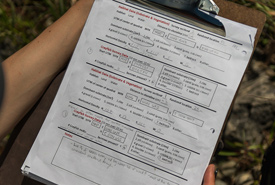
A Conservation Volunteer takes notes during a survey of queen snakes (Photo by Bruce Kennedy)
NCC often enlists the help of volunteers to collect data to contribute to its science and stewardship plans. Whether it’s collecting data for marine debris research in PEI using the Marine Debris Tracker app, or surveying milkweed plants and monarch butterflies in Manitoba to inform conservation efforts, NCC has tons of opportunities to pad your resumé with data collection experience.
Skill: Ability to work collaboratively with a diverse team
Finally, and perhaps most importantly, volunteering builds communications skills and demonstrates that you have the ability to work collaboratively with a diverse team. When it comes to the environmental field, you won’t get far without collaboration.
From local landowners, to partner organizations and community members, jobs will often require you to work with a vast diversity of people, often with differing viewpoints and expertise levels.
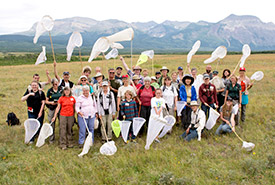
CV event, Waterton butterfly survey (Photo by NCC)
In my experience, volunteering is also a great way to meet and network with people you would otherwise never cross paths with. The best way to meet senior staff and influencers responsible for hiring is to get outside and volunteer alongside them.
When you volunteer with an organization, you get to meet the staff and partners. When hiring season comes along, these people won’t forget your name.
One of our former interns, Kate Williams, is a great example of this! Read about how she went from volunteering to being hired on as one of our Conservation Interns in 2016.
If you’re ready to start building your resumé, check out our calendar of Conservation Volunteers events at conservationvolunteers.ca to find a project near you!


